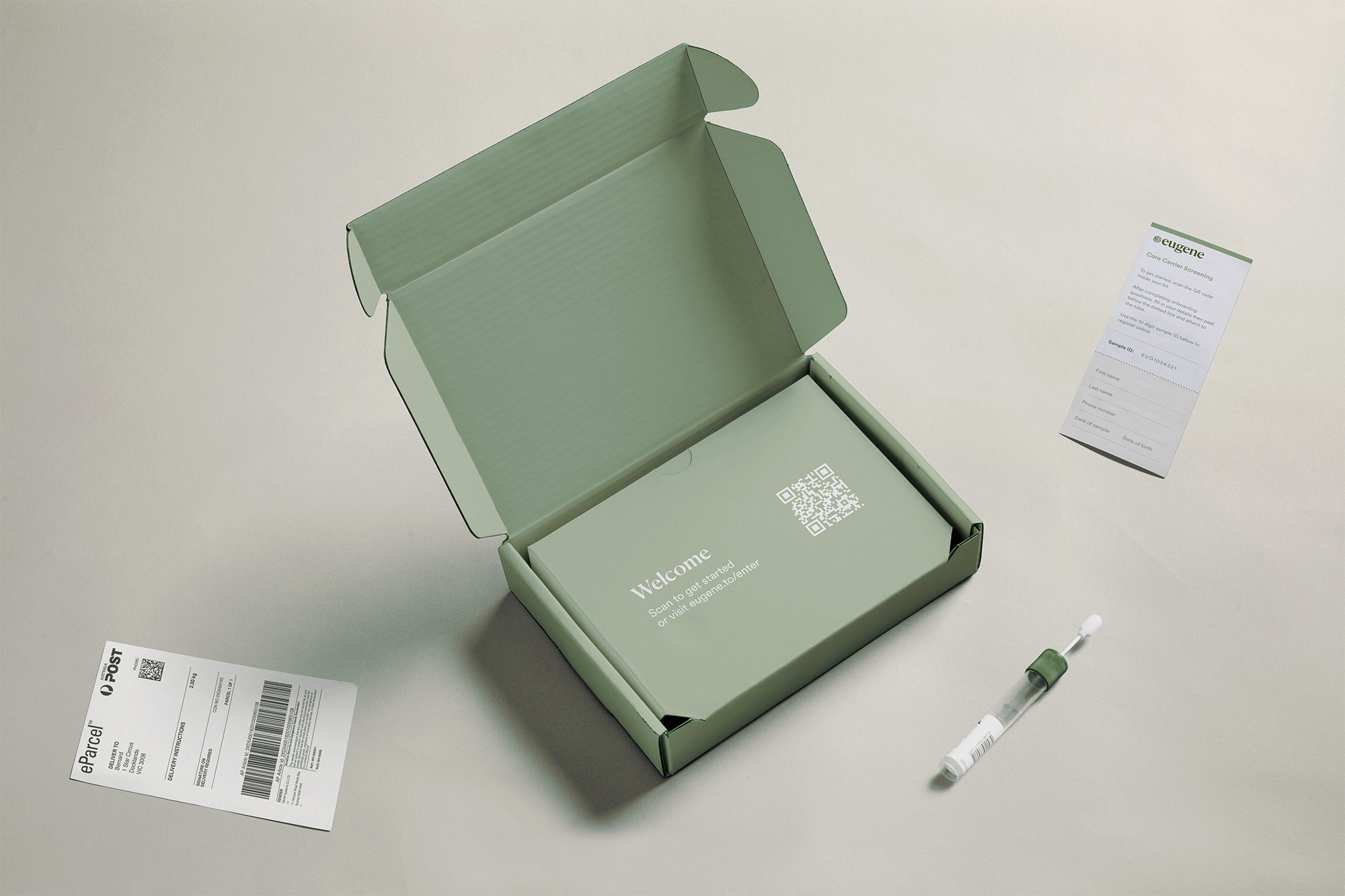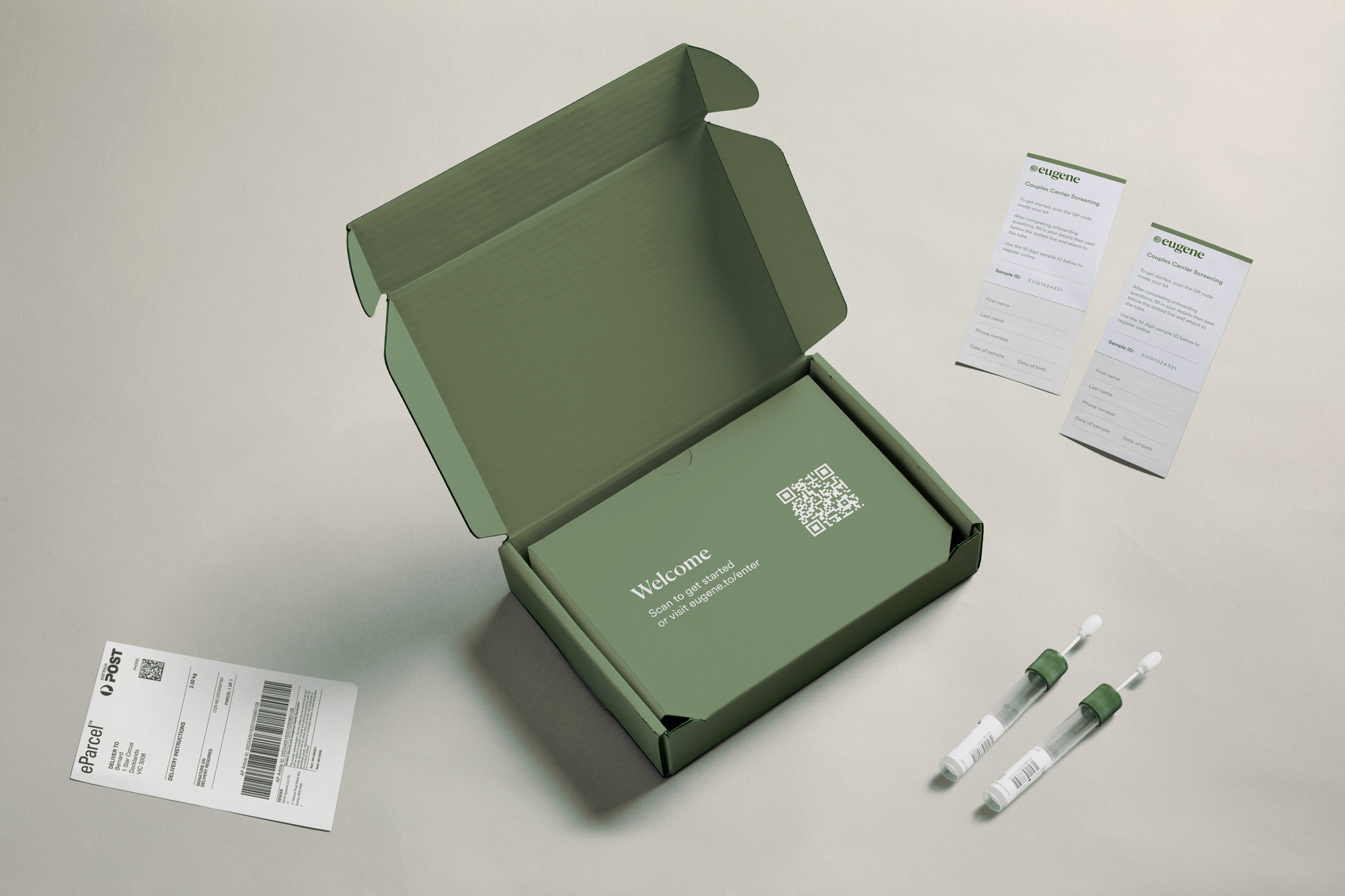
Clarity and confidence on your path to parenthood.
Carrier screening for up to 700 inherited genetic conditions helps you understand your chances of having a child with a genetic condition. With at-home testing, expert genetic counselling, and Medicare-covered options, we’re here to support you to plan with confidence.
Understanding Reproductive Carrier Screening
The common conditions we screen for include Cystic Fibrosis, Spinal Muscular Atrophy, Thalassemia, and Tay-Sach disease, but there are 780+ recessive and X-linked conditions that are screened in our comprehensive carrier test.
84%
of people will be found to carry at least 1 variation on a Comprehensive Carrier test
1 in 40
of couples who do the Comprehensive Carrier test are identified with an increased risk
79%
of increased risk couples will be missed by the Core test

Compare our reproductive carrier tests
Explore genetic testing options tailored to your needs
| What's included | |||
| Total genes screened |
|
|
|
| Who is this test for? |
|
|
|
| Reproductive risk |
|
|
|
| Individual carrier result |
|
|
|
| Medicare rebate |
|
|
|
| Genetic counselling support |
|
|
|
| Express return shipping |
|
|
|
| Results turnaround time |
|
|
|

Genetic testing for rainbow families
Comprehensive Carrier Screening is designed to support all types of rainbow families on their path to parenthood, including same-sex couples and individuals using donor gametes. With tailored insights, you can plan your family with confidence and clarity.
Carrier screening products
Explore our range of reproductive genetic tests
Core Carrier Screening
Couples Carrier Screening
Comprehensive Carrier Screening
How testing works
On demand - simple, at-home testing and counselling

1. Order your test
Order online and delivered to your door
2. Share your story
Help us to make testing meaningful to you and your goals
3. Provide your sample
Simply swab and return your kit via prepaid package
4. Get your results
Free telehealth consult with an accredited genetic counsellor
Frequently Asked Questions
What is the Eugene turnaround time?
What is the Eugene turnaround time?
From the moment we receive your samples back, our turn around time is approximately:
- Core Carrier Test: Results ready within 4 weeks
- Comprehensive Carrier Test: Results ready within 4 weeks
- Couples Carrier Test: Results in 6 - 8 weeks
All other tests: 4-6 weeks
Tests cannot be expedited and the turn-around time is subject to the performance of each sample at the lab. While some samples provide results after one attempt, others require multiple attempts. In a small number of cases, samples may fail and a new sample will be required. In this instance, the turn-around time will be as informed above from the moment we receive the new sample.
If you are doing this test with a reproductive partner, we need both results to be ready to prepare your couples report.
Once your results are available, we will send you an SMS inviting you to book an online video consult with one of our genetic counsellors to discuss your results.
Do I need to be referred by a doctor?
Do I need to be referred by a doctor?
Our members can be self-referred or have a referral from a healthcare practitioner.
If you have been referred by a healthcare practitioner, there is a ‘referring doctor’ field that you can fill in to let us know that you’d like us to share your results with them.
If you are self-referred or have another practitioner that you’d like your results to be shared with, you are welcome to add their details there too.
How can I share my results with my doctor?
How can I share my results with my doctor?
While Eugene genetic tests do not require a doctor referral, we are all about open and clear communication and we are always happy to send your results and action plans to your specified doctor. You will have the opportunity to add your doctor's details throughout your journey of genetic testing.
You will need to provide consent to sharing any of your private health information with anyone other than yourself, so we rely on you to include details of any members of your care team.
Is genetic testing limited to people of specific ethnicities?
Is genetic testing limited to people of specific ethnicities?
Here at Eugene, genetic diversity is at our very core and we will work with you to ensure wherever you are from or whatever community you associate with, that we cover the bases and make testing as tailored to you as possible.
For example, our Carrier Test includes everything in the 3 gene test and more. By using a wider panel we identify nearly 90% more couples who are at risk and cover conditions more common in our ethnically diverse community.
Can I get a Medicare rebate for Carrier Screening?
Can I get a Medicare rebate for Carrier Screening?
The Core Carrier Screening and Couples Carrier tests are currently Medicare-eligible.
Our Comprehensive tests are not eligible for Medicare benefits since they are conducted through our partner laboratory in America.
If you meet the eligibility criteria, select the "bulk-bill" Core carrier test option—no upfront payment is required. However, if we later determine that you don't meet these criteria, you'll need to pay the full test cost before we can proceed with testing.
Once you've completed your bulk-bill Core Carrier Test purchase, you'll need to provide your Medicare card during the Eugene onboarding process. You'll receive the onboarding steps via email, and you can also access them by logging into your account.
The Couples Carrier Test (620+ genes) is partially covered by Medicare. The Core test for the person assigned female at birth is bulk-billed through Medicare, with a $949 out-of-pocket cost remaining for the couples' extended panel.
This out-of-pocket amount cannot be claimed through any additional benefits.
Do I need a doctors referral to claim a Medicare rebate?
Do I need a doctors referral to claim a Medicare rebate?
No doctor referrals from your local practitioner are needed to checkout with the bulk-billed Core Carrier Test or the Couples Carrier Test we take care of that for you.
Carrier screening resources
The Impact of Doctor Bias on Prenatal Testing: Empowering Yourself to Make Informed Choices
Doctors can be fantastic advocates for you by listening to your concerns, providing clinical assessments and helping you access the care and treatment you need to manage acute or chronic illness symptoms. But what happens when you go to the doctor with a concern that isn’t met with the openness you were hoping for? How can you advocate for yourself and your right to access the care you want? As expectant parents, many available assessments can help you best prepare for pregnancy and identify possible risks that you may wish to navigate to improve you and your future babies' health. Considerations include lifestyle factors, appropriate dietary supplementation, optimising pre-existing medical conditions, reviewing your past obstetric and gynaecological history, reviewing and optimising your mental health, reviewing current medications and ensuring none are unsafe during pregnancy, and checking vaccinations are up-to-date. It is a long list of things to discuss and check in on. However, in some cases, more history is needed to provide the whole picture and the reassurance that was once believed. Another critical aspect of preparing for pregnancy is understanding that all healthy individuals, regardless of ethnicity or family history, carry changes in their DNA. Depending on the combination of changes, these could impact the health outcomes of their children. Genetic counselling and testing can provide valuable information about your baby's health and help you make informed decisions regarding your pregnancy. However, it's essential to be aware that the recommendations for tests can be influenced by a doctor's biases. In this blog post, we will explore how doctor bias can impact the tests offered to you and why understanding your options is crucial. We will also discuss ways to advocate for what you want, ensuring that your choices align with your values and preferences. Understanding Doctor Bias: Doctors, like all individuals, carry their own biases, which may inadvertently influence the tests they offer. Factors such as personal experiences, training, and professional affiliations can all contribute to these biases. It's essential to recognise that doctors are not immune to these influences, and their recommendations may not always align with your desires or beliefs. Did you know that doctors are supposed to inform all expectant parents about the availability of genetic carrier screening? Yet many do not. At Eugene, we do not require a doctor's referral to access the care and support you want. The Importance of Understanding Your Options: Being aware of the various prenatal testing options available to you is vital. Different tests carry different benefits, risks, and limitations. Some tests provide comprehensive genetic information, while others focus on specific conditions. Understanding your options empowers you to make informed decisions aligning with your values, beliefs, and circumstances. Advocating for What You Want: Research: Educate yourself about the different types of tests available, their benefits, limitations, and associated risks. Reliable sources such as medical literature, reputable websites, and seeking advice from genetic counsellors can provide valuable insights. Communicate Openly: You can communicate openly and honestly with your healthcare provider. Clearly express your desires, concerns, and preferences regarding prenatal testing. By sharing your perspectives, you can actively engage in a collaborative decision-making process. Seek Multiple Opinions: If you feel that your doctor's recommendations are biased or do not align with your preferences, consider seeking a second opinion. Consulting a genetic counsellor or healthcare professional can provide alternative perspectives and help you make a more informed choice. Build a Support Network: Connect with other expectant parents or support groups who have gone through similar experiences. Sharing your thoughts and concerns can provide emotional support and help you navigate the decision-making process more confidently. Trust Your Instincts: Remember that you are the ultimate decision-maker for your pregnancy journey. Trust your instincts and intuition when making choices about prenatal testing. It's essential to prioritise what feels right for you and your family. Genetic carrier screening is an essential component of obstetric care, providing valuable insights into your baby's health. Understanding your options, actively communicating your preferences, seeking multiple opinions, and trusting your instincts are powerful tools to advocate for the testing approach that aligns with your values. Empower yourself with knowledge and take an active role in shaping your pregnancy journey, ensuring the best possible outcome for you and your baby.
Trying for a Second or Third Child: Is Genetic Carrier Testing Necessary for Your Growing Family?
As families grow and expand, parents often consider their options and make important decisions regarding the health and well-being of their children. One such consideration is genetic carrier screening, a test that helps determine the risk of passing certain genetic disorders to offspring. While the decision to undergo genetic carrier screening is personal, understanding its benefits and implications can provide valuable insights. In this blog post, we explore the relevance of genetic carrier screening when trying for a second or third child. What is Genetic Carrier Screening? Genetic carrier screening is a medical test identifying individuals with genetic variations associated with specific inherited conditions. Typically, these conditions are recessive, meaning both parents must carry the mutation for their child to be at risk. The screening test helps prospective parents assess their risk of having a child with a genetic disorder and make informed decisions about family planning. The Rationale for Genetic Carrier Screening: Knowledge is Power: Genetic carrier screening empowers parents by providing them with essential information about their potential risk of passing on genetic conditions to their children. Armed with this knowledge, parents can make informed decisions regarding family planning, explore available treatment options, or seek genetic counselling for a deeper understanding of the implications. Expanded Screening Panels: Over time, advances in genetic testing technology have allowed for the development of expanded screening panels. These panels test for a broader range of genetic disorders, offering more comprehensive insights into potential risks. Parents can gather extensive information and minimise the chances of overlooking specific conditions by opting for such panels. Changing Genetic Landscape: Even if you have previously undergone genetic carrier screening, it is worth considering that the testing landscape is constantly evolving. New genetic discoveries are made regularly, leading to the inclusion of additional conditions in carrier screening panels. Thus, revisiting carrier screening for subsequent children can ensure that you are up to date with the latest advancements in genetic testing. Potential Implications for Siblings: While you may already have a child without any known genetic conditions, it is essential to remember that genetic disorders can vary among siblings. The genetic makeup of each child is unique, and subsequent pregnancies can carry a different risk profile. Thus, carrier screening for subsequent children can help identify potential risks that may not have been detected previously. It is essential to consider how new information may make you feel about health risks for the children you already have. Seeking guidance from a genetic counsellor can help you prepare and manage how new information can be interpreted and used. In general genetic screening of minors (under 18 years) is not recommended, especially if they are well and there are no apparent differences in their health, growth or development. Genetic carrier screening is a personal decision that depends on various factors, including your family history, ethnicity, and personal beliefs. When trying for a second or third child, revisiting genetic carrier screening can provide valuable insights into potential risks and empower parents to make informed decisions about family planning. By staying informed about the latest advancements in genetic testing and seeking professional advice, parents can ensure the best possible outcomes for their growing families. Remember, knowledge is power, and taking proactive steps can lead to your children's healthier and happier future. Start your preconception plan to grow your family here.
Jessi & Millie Poutama's Baby Journey: Insights from Queer Mums
Planning a family can feel like a giant undertaking. And until you’re in the thick of it, you don’t realise how many questions you will have. If you're ready for a baby as a budding LGBTQIA+ parent, you may even feel a few more considerations and questions, so we thought, who better to relieve those than our favourite Queer Mum, Millie Poutama. Jessi & Millie Poutama are two mums living sustainably off-grid with their toddler Tide and dogs. We love keeping up with their family @jessiandmillie on socials and are grateful to learn about and share their journey to parenthood. We will let Millie take it away... Do you remember the first time you had “that” conversation? The one that starts something like… “I was thinking… that maybe we should try and get pregnant”, or perhaps it sounded something like “, What if I just came off the pill for a few months, and we see what happens?” Or maybe it wasn't a conversation at all; perhaps it was a moment in time, the ding of an email notification about Becky's maternity cover that awoke something in you? or that day when you held your nephew for the first time and you inhaled that indescribable newborn smell and you just knew, you felt it, that feeling of “I am ready.” I remember those moments, those first conversations, the excitement and nervous energy I felt as I casually moved my spaghetti around on the plate, searching for the words, feeling the silence between us before I found the courage to look up at my wife and say “Honey I kinda really want a baby” and I will never forget the smile on her face when she said, “me too.”So what next?If you were anything like us, perhaps you excitedly poured a wine, grabbed the laptop, and started browsing sperm donors, reading the profiles, and laughing as we disagreed about wanting a donor that could play classical piano v’s one who played rugby. Maybe you started a Pinterest board of nursery decor. Maybe you ran out to the shops and bought your first 0000 onesies. Maybe you googled the best prenatal vitamin available and clicked add to cart. We did all those things and have no regrets because part of planning for a baby is about all those moments of joy, expectation, anticipation and genuine hope [or possibly naive belief] that everything will go to plan. Some couples try to conceive for years…Some people have miscarriages…Some people have children born with a disability or a genetic condition……but that won't happen to usBut what if it does?Those things did happen to us, but we wouldn't change it because, in November 2021, we welcomed our beautiful baby Tide Koha, who is perfect in every way. There are still some things, however, that I desperately wish I had known at the start of our journey. If you are reading this at the beginning of your baby journey, here are four things I wish someone had told me… Having a baby is a marathon, not a sprint, and while there will always be some people that cruise to the finish line, barely breaking a sweat and accepting their “medal” with relative ease, unfortunately, this will not be the case for many. Does that mean we aren't going to run the race? Of course not. Just know that if you reach the point when your body and spirit are broken, and you’re facing hills that seem impossible to climb, sometimes having a crowd cheer you on is all you need to keep going. Get a support team in place, and get a therapist if you can afford one because, like a marathon, the road to having a baby is mostly what your body can do, but it's often what your mind is capable of that will get you to the finishing line. It is a MUCH more straightforward process to do preconception genetic testing than going through the process of genetically testing your child. If there is one piece of advice I wish everyone would seriously consider is to have preconception genetic testing by Eugene before trying to get pregnant. I talk about it to everyone and anyone as soon as they mention they are trying to conceive. During our IVF process, I remember a brief moment when genetic testing was mentioned, but it was so fleeting that I don’t remember what was even discussed. There was certainly not an explanation of the pros & cons. The Eugene at-home genetic test checks to see if you or your partner/sperm donor carry a rare gene variant that could cause a serious and life-threatening genetic condition in your child. I wish someone had taken the time to explain the importance of genetic testing to me. The peace of mind it can bring or the crucial information it can provide to make informed reproductive choices for your family. The thing about rare gene variants is that they are rare, but when you factor in all the different types of rare genetic variants, collectively, they are common. In fact, for every 40 couples deciding to have a baby, 1 of those couples will both be carriers of the same genetic condition. When a couple are both carriers, there is a 25% chance that the baby could be born with that condition. The Eugene testing process is quick; it's shipped within two business days and takes on average 3-6 weeks from the day they receive your sample to get the results back and schedule your appointment with a genetic counsellor to learn about your results and have an opportunity to ask any questions. When our son was diagnosed with moderate to severe developmental delays, we were told a genetic condition could be the cause. We did a Eugene test because we knew it would be the quickest way to get some reassurance before planning our next round of IVF and for our future babies. Thankfully the Eugene test showed none of the most common severe genetic disorders were shared by both myself and the donor, which gave us much-needed reassurance to start talking about a sibling for Tide.It is worth mentioning that the Eugene test did, however, show a couple of conditions, which, had we chosen another donor who just so happened to also carry them, then it could have been a very different outcome and really shows the importance of pre-conception testing between partners or donors. We are currently going through the process of genetically testing Tide with the children's hospital. We are six months in and have been told to expect final results in another six months. In comparison to the quick results from Eugene, the genetic and chromosome testing rounds with the children's hospital have taken a very long time. Enjoy the ride and find joy in the little things. Don’t get me wrong; this isn't about toxic positivity because some days aren’t going to be joyful; in fact, some days might suck. But finding the smallest moments of joy, even on the hard days, can make the biggest difference to your mindset and overall mental health. Have a preconception, baby moon. Don’t wait until you are heavily pregnant and can hardly move to go to a hot country where you can't drink the margaritas. When you decide to have a baby, if you have the opportunity, take the holiday then instead and spend some incredible one on one time to kick-start your baby-making journey. For more information about starting your baby journey with the help of Eugene preconception testing, you can click here.










